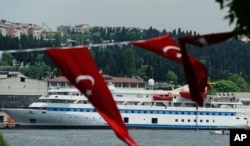Israel and Turkey have reportedly reached a preliminary agreement to end years of estrangement and begin restoring full diplomatic relations.
The two countries, once close regional allies, fell out after a deadly confrontation in 2010 between Israeli commandos and Turkish activists on a passenger vessel seeking to breach Israel’s naval blockade of the Gaza Strip.
According to reports citing Israeli officials, Israel will pay around $20 million in compensation to the families of the 10 Turkish activists killed by Israeli commandos. In exchange, Ankara will drop legal cases against those involved.
Turkish officials, however, are being cautious, saying that while a deal might have been reached, it had yet to concluded.
Political columnist Semih Idiz of Turkey’s Cumhuriyet newspaper said an important obstacle remained.
"[Turkish] President [Recep Tayyip] Erdogan has committed himself very strongly to a set position, and he keeps insisting on the lifting of the Gaza siege," Idiz said. "So although they are talking about a road map, we have to see what the details are. But there is no doubt there is some movement."
Lifting the Gaza embargo has always been a deal breaker for Israel and a reason why previous rapprochement efforts failed. But analysts say a compromise will likely be found. As Turkey finds itself increasingly isolated in the region, a deal with Israel may now be in its interests.
Ankara’s isolation, brought on in part by its stance on the Syria war, grew after Turkish jets downed a Russian bomber last month near the Syrian border. The crisis has put pressure on Turkey to diversify its energy dependence on Russia, and dovetails with long-standing pressure from Western allies to make peace with Israel. Turkey is seen as an obvious market for Israel’s newly discovered natural gas reserves.
But international relations expert Soli Ozel of Istanbul’s Kadir Has University said that the recent Iran nuclear deal, which would let Tehran play a larger role in world energy markets, might be the real driving force behind rapprochement efforts.
"There is structural, strategic imperative with concern about Iran at the center of it all," Ozel said. "The Iran deal is going to be operational this spring. Tehran, I am sure, is preparing itself for after the embargo on it is lifted and I think everyone is taking their positions. At a time when Saudi and Israel interests are so aligned, I think Turkey is also making its own alignment."
Both Jerusalem and Ankara have voiced equally strong concerns about the Iran deal. While obstacles still remain to Israeli-Turkish rapprochement, it appears for now that there is momentum from both sides for reconciliation.
The news of a potential restoration of ties between the two countries came a day after Israeli Prime Minister Benjamin Netanyahu signed a deal giving long-awaited approval for the development of plans to build a pipeline to send natural gas from Israel's vast Leviathan field in the eastern Mediterranean Sea.
Leviathan, with estimated reserves of 622 billion cubic meters, will cost at least $6 billion to develop. It is meant to begin production in 2018-2020, although that timetable now looks ambitious, and is to supply billions of dollars' worth of gas to Egypt and Jordan, and possibly Turkey and Europe.
Israeli Energy Minister Yuval Steinitz said normalizing ties with Turkey had huge importance both to develop the Leviathan stake and to bring international energy firms back to Israel to look for new gas fields.
"I think that there is a serious, meaningful chance for thawing and normalizing relations between Israel and Turkey. I also think that this is proof of the diplomatic value of the gas and the gas plan," he said on Tel Aviv 102 FM radio.
Turkish firms have long been negotiating with Israeli counterparts on a pipeline to carry Leviathan gas. Both Zorlu Energy and a consortium of Turkish firms Turcas and Enerjisa have been in talks with Israel over the price, potential route of a pipeline, partnership structure, and how to sell the gas, a Turkish source said.
Some information for this report came from Reuters.





